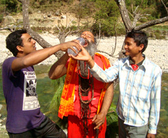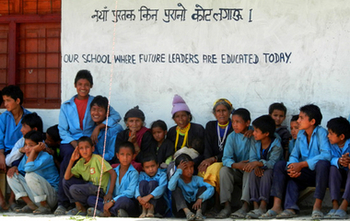Improving livelihoods in rural communities
Project description
Title: Improving livelihoods in rural communities in Nepal
Commissioned by: German Federal Ministry for Economic Cooperation and Development (BMZ)
Country: Nepal
Lead executing agency: Ministry of Peace and Reconstruction
Overall term: 2009 to 2013

Context
The districts of Baitadi and Bajhang in far-western Nepal have been neglected by the government for many years. During the ten-year (1996-2006) civil war, the socio-economic situation became even worse. At the beginning of the project, food security was less than five months in Baitadi and less than four months in Bajhang. There is a lack of infrastructure, and women and so-called low castes face massive discrimination.
MPs initiated the transfer of a successful concept from neighbouring districts to Baitadi and Bajhang. The German Federal Government agreed to help.
The key challenges consist of fighting food shortages while developing sustainable sources of income and enabling disadvantaged groups to participate in society and the economy.
Objective
The livelihoods of poor and disadvantaged sectors of the population in the districts of Baitadi and Bajhang are improved.
Approach
The project is tackling the pronounced food deficit. Infrastructural initiatives agreed jointly with the district government and the population offer temporary employment, remunerated with money and food. At the same time, an infrastructure is being created that will improve income prospects in the long term.
In the first two years, the project focused on increasing agricultural production through irrigation, better seed and resource-efficient techniques. The next step was to commercialise the farming process, which involved specifically growing food for sale, seed production, further processing to add value and product marketing.
Alternative sources of income have been developed through vocational and on-the-job training. Women and other disadvantaged groups are improving their level of education in informal learning centres. They need to be able to read and write and do arithmetic before they can benefit from the project activities to the same extent as better educated sectors of the population.
Self-run savings and credit groups provide micro-loans for income-generating activities. The learning centres are increasingly resolving neighbourhood conflicts and launching social campaigns, such as initiatives against alcohol abuse and domestic violence. This enables participants to advance socially and to play a part in community decision-making.
The Ministry of Peace and Reconstruction is the project's national partner. The project is co-financed by the World Food Programme (WFP) and the Food and Agriculture Organization (FAO). The International Labour Organization (ILO) and the children's charity UNICEF are also cooperation partners.
Results achieved so far
A total of 14,830 families were able to get through the worst shortages with the food they produced and the money they earned through their work in infrastructure projects, as a result of which 33 kilometres of the planned 48 kilometres of road have already been completed.
In addition, 58 schools offer basic education to 17,000 pupils. The proximity of these schools to pupils' homes encourages girls and children from disadvantaged backgrounds in particular to attend.
New irrigation systems for 704 hectares of land are improving the agricultural conditions for over 4,000 families, while better seed is increasing rice, maize and wheat production by between 29 and 56%. Commercial producers have increased their food security by 60 days.

The rapid socio-economic development is particularly evident in the way that women and disadvantaged castes are now positioning themselves in the public arena. Radio and press coverage of the first official 'Eating together!' event, attended by disadvantaged and high castes, government representatives and a Hindu priest, was intensive and positive.